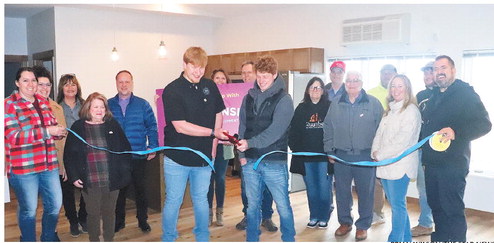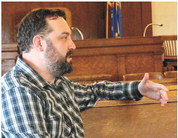County looks to tighten belts
Budgets and belt-tightening were the order of the day as departments brought budgets to the county’s executive committee on Friday afternoon.
In Taylor County, oversight committees review departmental budgets before sending the budgets to the finance committee, which also holds hearings with each department representative to craft the draft county budget which is then approved by the full board at the end of October.
The departments with elected department heads including the county clerk, register of deeds, and county treasurer presented their budget proposals to the executive committee. The committee also addressed the corporation counsel’s contract and the request for increase from the Taylor County Humane Society.
County register of deeds Jayme Kohn presented a budget with a request to increase an existing part-time position in her office to being full-time. She said the part-time position is currently vacant and has been difficult to fill since those with the qualifications for the position typically can’t afford to work just a part-time job. She explained having an additional person in the office is necessary for times when her chief deputy is using paid time off (PTO).
“It is tough to run an office with one person,” Kohn said, noting that the office was closed as she was at the meeting.
Kohn also said bringing a person on board now will help with succession planning in the county. She said she does not intend to run for reelection after her current term expires and having someone fully-trained will help ensure continuity of services in the office.
“We don’t have a good succession plan in our office,” Kohn said.
Committee member Chuck Zenner said he understood Kohn’s need to have someone trained to take over when she retires, but said it was premature to look at that now. Kohn’s term ends in 2028.
Typically new position requests would go through the personnel and finance committees. Kohn said she was bringing it up now to have the money in the budget first before going through the personnel process. “Three and a half years is a little long. A year from now I would be more OK,” Zenner said.
As part of the budget process, departments also reviewed their carryover funds with the goal of eliminating or consolidating the number of them. The register of deeds office has two carryover funds which have a total of $123,000 between them with the money coming from designated filing fees on documents. The funds are for modernization of land records. It was noted that some officers around the state have used these funds for personnel costs.
Committee members also looked at the revenue side of the budget, with Zenner noting that the actual revenue is much higher than what is budgeted each year. Kohn said that they were directed by the finance director in the past to keep the same number. The additional revenue goes back into the general fund. Zenner said it should be raised to be the average of past four to five years of revenue to be more accurate.
In the end, committee members voted 2-1 to send the departmental budget to the finance committee with the full-time position, tapping into the carryover funds to help pay for it. Committee member Scott Mildbrand was opposed noting it was a 10.5% budget increase.
The treasurer’s office proposed budget garnered relatively little discussion with the total increase kept at $8,400 due to wage and benefit increases. It was noted that all the budgets included a projected 5% increase in health insurance. The actual health insurance increase for the county will be far lower than that.
There were also few changes with the child support budget. The most significant change is in how the billing will be done for corporation counsel and the amount, which was dependent on the contract between the county and attorney Courtney Graff.
Graf, who has served as the county’s attorney since 2012, requested an increase in her new contract which she described as being a catch -up to come closer to matching what other attorneys are charging in the market.
Rather than having an attorney on staff, Taylor County contracts with the law firm of Schmiege, Graff & Koch LTD. to serve as the county’s corporation counsel. This work is divided into two areas. The first deals with human services and the courts. The other deals with providing general legal services and support to departments and the county board. Graff said she was seeking an increase in both of those amounts to be in line with market rates.
“We are not asking to be overpaid, but to be comparable,” she said. With the change, her hourly rate for providing legal advice to the county and attending county board sessions would go from $190 per hour to $230 per hour.
Mildbrand proposed an alternative to spread the increase over two years and have the county sign a two-year contract with her firm. Zenner noted a 21% jump is significant, even if the amount has not changed for a number of years. “I would rather have steady small increases rather and a large one,” he said.
In the end, Graff and the committee agreed to two-year deal with a $30 increase in her hourly rate this year and a $10 increase the following year.
Graff emphasized that she was not billing the county for that meeting.
Things were less cordial for the humane society and their requested increase. The Taylor County Humane Society (TCHS) is an independent nonprofit based in Medford that provides dog shelter services under contract with Taylor County.
While in the past the contract went through the county’s law enforcement committee, it came to the county’s executive committee this time around.
Representatives from the TCHS presented a contract update to go from $53,783 in 2025 to $63,264 in 2026. In addition, TCHS is asking for a $25 per day boarding fee for animals that are seized by the sheriff’s department for such things as animal neglect cases. The boarding fee is recoverable through the courts through restitution fees ordered.
Representatives explained that they are being hit hard with the number of dogs being surrendered. They said they have been up to 90 dogs in a day and that while adoptions have gone up a little, there is still a significant amount of dogs in the shelter.
While the county generates about $2,500 a year in dog license fees, this does not come near covering the cost of providing shelter services.
The county’s contract with TCHS covers about half of the shelter’s overall operational costs. The shelter relies on fundraising and donations to cover the remainder of their budget.
Mildbrand said TCHS is asking for a 30% increase. He spoke of meeting with the health department and crunching the numbers to get to a 0% increase for that department. He said the county needs to prioritize spending.
“How am I going to make the board of health stay at 0% and the next day be asked to vote on 30% for the humane society. I just can’t do that,” Mildbrand said.
“I can’t go with 30%, but I can’t go with 0% either,” Zenner said. “People are just irresponsible with their animals.” Committee members approved giving the TCHS a 5% increase.
County board budget The county board budget is seeing an increase due to more board members going to conferences and there being more county board meetings in general. Clerk Andria Farrand said there are 9 board members attending the fall conference at an average price of $800 per person attending in registration, room and per diem.
Farrand suggested an area of cost savings would be to not designate an official newspaper which she said would eliminate the county having to publish meeting minutes from county board meetings. She noted that her department spends about $10,000 a year on legal notices. While there are a number of publication requirements such as for bids, the county has spent $359.18 publishing minutes so far in 2025 and in 2024, the county spent a total of $1,024 publishing county board minutes.
It was noted that there are legal requirements at the state level which require certain publications outside of what is in county code. For their part committee members expressed opposition to not publishing the minutes, with Mildbrand noting that transparency is needed.
Mildbrand suggested a better option would be to look at reducing the number of meetings or looking at scaling back the number of lay members on county committees.
Judicial privacy policy Taylor County is working on a process to allow judges and other “court officers” to keep their address information off a public online records searches. The judicial privacy laws are to prevent people from being able to use public records to stalk and potentially harm judges and their families.
How those new rules will apply at the county level and how requests are handled is at the heart of a policy discussion with the county’s executive committee members. Under the draft policy, the formal written requests would go through the county clerk who would disseminate it to the appropriate county department.
Kohn noted she already has had one come to her office that used the state template. She said it specifically states that it is to the department listed.
“It is a work in progress,” Farrand said. It was suggested to direct people to make the request through the clerk’s office as a central location rather than through each department.
It was noted that until the county actually received the request on the state form, that no one knew what it looked like or how it should be handled.
Committee members approved the draft policy to have something in place to work with and that it will go to the full county board for final approval.
ADRC settlement Taylor County will not pursue getting the remainder of the money owed by the now-defunct ADRC of the Northwoods.
The county had loaned that aging and disability resource center organization $75,000 to assist with cash flow to allow it to meet expenses as it waited for reimbursements from the state and federal government. The money was loaned with the stipulation that if the ADRC of the Northwoods ceased to exist, the money would be paid back to Taylor County. The county has received a $52,000 check with what was remaining in the ADRC of the Northwoods accounts and there have been some county board members pushing for legal action to get the remainder of the funds owed county taxpayers.
Zenner said he does not believe the county will get any more money from the ADRC of the Northwoods and that it will end up costing the county to pursue it further. “I feel it is chasing good money after bad and we need to move on,” Zenner said.
ADRC of Taylor County director Jenn Viergutz agreed. “I appreciate you guys looking out for the taxpayers, but it is time to let it go,” she said.
She said the further the county takes it, the more difficult it would be to work with the state and Greater Wisconsin Agency on Aging Resources (GWAAR). She said she has been able to work with those and get additional funding for Taylor County which has helped save tax levy dollars in the county.
The concern is that if the county is aggressive in pursuing the money owed, it may damage the county’s ability to get supplemental funding in the future.
In addition, attorney Ann Koch who has been working with the county on the issue, projected it could end up costing more than the county would get back to take the state to court over the difference in what was owed.
Committee members agreed to stop pursuing the money owed.





